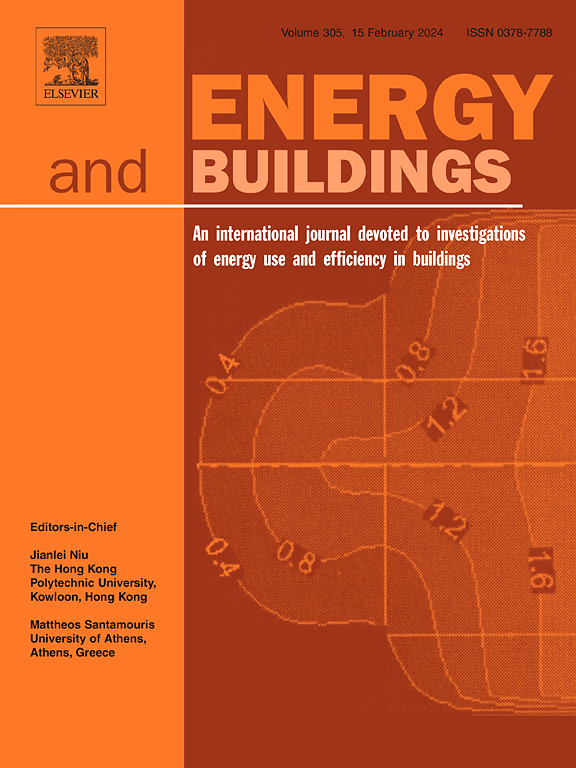建筑性能仿真数据驱动的乘员行为模型中任意不确定性和认知不确定性的量化
IF 6.6
2区 工程技术
Q1 CONSTRUCTION & BUILDING TECHNOLOGY
引用次数: 0
摘要
居住者行为(OB)是建筑性能模拟中不确定性的主要来源,对能耗和室内环境条件有重要影响。虽然基于机器学习的OB模型显示出强大的预测能力,但它们的可靠性往往受到数据限制、外推错误和缺乏明确的不确定性量化的影响。本研究引入了贝叶斯深度学习(BDL)框架,通过量化ob相关的不确定性来解决这些挑战。使用蒙特卡罗(MC) dropout,该框架区分了任意不确定性(固有随机性)和认知不确定性(知识限制)。在为期三个月的夏季期间,研究人员利用韩国首尔六户家庭的数据进行了实验。本研究通过与EnergyPlus和BCVTB的联合模拟,研究了训练期如何影响不确定性,并评估了其对能源预测的影响。结果表明,任意不确定性是模型验证过程中的主要因素,主要是由于传感器噪声和不可预测的乘员行为。然而,在联合模拟中,认知的不确定性增加了,特别是在外推条件下,导致能量预测的变异性更大。延长训练时间减少了认知不确定性,将能量预测的变异系数从54.3%降低到20.4%,但对任意不确定性没有明显影响,这证实了OB固有的不可预测性。这些发现强调了在评估数据驱动的OB模型时,需要将不确定性指标与准确性指标结合起来,因为预测置信度对于基于模拟的决策至关重要。此外,观测到的能量预测中的不确定性传播强调了概率建模相对于确定性方法的优势。本研究为将不确定性分析集成到数据驱动的OB建模中提供了一个系统框架,为提高模型的鲁棒性、泛化性和建筑性能模拟的实际适用性提供了见解。本文章由计算机程序翻译,如有差异,请以英文原文为准。
Quantification of aleatoric and epistemic uncertainty in Data-Driven occupant behavior model for building performance simulation
Occupant behavior (OB) is a major source of uncertainty in building performance simulations, significantly influencing energy consumption and indoor environmental conditions. While machine learning-based OB models have shown strong predictive capabilities, their reliability is often undermined by data limitations, extrapolation errors, and a lack of explicit uncertainty quantification. This study introduces a Bayesian Deep Learning (BDL) framework to address these challenges by quantifying OB-related uncertainties. Using Monte Carlo (MC) dropout, the framework distinguishes between aleatoric uncertainty (inherent randomness) and epistemic uncertainty (knowledge limitations).
Experiments were conducted using data from six residential households in Seoul, South Korea, over a three-month summer period. This study examines how the training period affects uncertainty and evaluates its impact on energy predictions through a co-simulation with EnergyPlus and BCVTB. Results indicate that aleatoric uncertainty was the dominant factor during model validation, primarily due to sensor noise and unpredictable occupant behavior. However, epistemic uncertainty increased in the co-simulation, especially under extrapolated conditions, leading to greater variability in energy predictions. Extending the training period reduced epistemic uncertainty, lowering the coefficient of variation in energy predictions from 54.3% to 20.4%, but had no noticeable effect on aleatoric uncertainty, which substantiates the inherent unpredictability of OB.
These findings highlight the need to incorporate uncertainty metrics alongside accuracy metrics when evaluating data-driven OB models, as prediction confidence is crucial for simulation-based decision-making. Moreover, the observed uncertainty propagation in energy predictions underscores the advantages of probabilistic modeling over deterministic approaches. This study provides a systematic framework for integrating uncertainty analysis into data-driven OB modeling, offering insights into improving model robustness, generalizability, and practical applicability in building performance simulations.
求助全文
通过发布文献求助,成功后即可免费获取论文全文。
去求助
来源期刊

Energy and Buildings
工程技术-工程:土木
CiteScore
12.70
自引率
11.90%
发文量
863
审稿时长
38 days
期刊介绍:
An international journal devoted to investigations of energy use and efficiency in buildings
Energy and Buildings is an international journal publishing articles with explicit links to energy use in buildings. The aim is to present new research results, and new proven practice aimed at reducing the energy needs of a building and improving indoor environment quality.
 求助内容:
求助内容: 应助结果提醒方式:
应助结果提醒方式:


